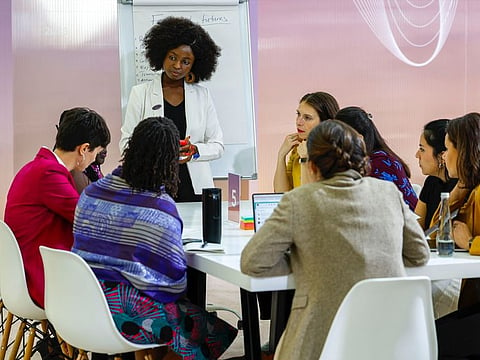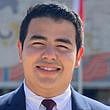Dubai Future Forum: Bring children to the decision-making table
Unicef launches playbook on youth foresight on second day of the forum

Dubai: Every child has a right to have a say in their future. But how can their voices be heard and included in the decisions that will shape their future?
This question was addressed at the launch of a book by United Nations Children’s Fund (Unicef) at the ongoing Dubai Future Forum. The Dubai Future Forum is an annual event hosted by the Dubai Future Foundation at the Museum of the Future, and is the biggest gathering of futurists in the world.
The Unicef playbook, titled ‘Designing a youth-centred journey to the future – A youth foresight playbook’, provides organisations with practical and effective ways in which they can bring in younger people to the decision-making table, to develop strategies and programmes that are focused on the future.
But what exactly is youth foresight?
“Foresight is a structured way to think about the future. It is partly about anticipating how the world is changing so we can be proactive, not reactive. But foresight is also about people. It is not just about flying cars and advancing technology. It is about humanity and our values, and who we are in that future. Youth foresight is the same structured way about thinking about the future but with the focus on youth and the issues that affect them,” Adam Sharpe, youth foresight specialist at Unicef Innocenti - Global Office of Research and Foresight, told Gulf News.
“Children have rights, they are a particular group so they need particular care and particular engagement,” he added.
Children have rights, they are a particular group so they need particular care and particular engagement.

Practical guidelines
The playbook has been co-authored by young people, too – Unicef Youth Foresight Fellows from across the world, who were also present at the book launch and helped the audience more practically understand the benefits of involving young minds in decision-making processes.
When it comes to youth engagement in any capacity, you need to meet them at their level of experience and build with them. Young people have a particular perspective that they bring based on their realities and the unique struggles they face. Therefore, expecting them to meet minimum experience criteria locks out a large number of young people from processes that would otherwise benefit from the youth representation. A good piece of advice would be to build their capacity to give them the skills and expertise whilst they continue to contribute to the process and decision-making.

As part of the workshop, eight members from the audience were asked to step up if they were working on a project for which they needed ideas. Each of these projects was then assigned a group, led by one of the Unicef Youth Foresight Fellows. By implementing some of the practical guidelines in the playbook, each group was able to generate innovative ideas for different types of projects.
Beyond tokenism
Speaking at the forum before the workshop, these young changemakers advocated for their seat on the table, highlighting all the ways in which young voices can help make policies that are more inclusive and effective.
Representatives from Egypt and Kenya spoke about how the work they did with Unicef focused on bringing in more diverse voices in the world of foresight from the Global South, including countries from Asia, Africa and South America.
Another Unicef Youth fellow, Ricardo Pineda Guzmán from Honduras, spoke about the need to take young voices seriously.
Addressing the forum, he said: “I am a climate activist and youth leader, and I want to speak about the broader issues. One issue that everyone is aware of is tokenism – young people are brought in just for the picture. It is something we have worked on because we really want to participate and get our hands dirty and play a role in transforming the future. The second issue is that the youth are not just beneficiaries of these policies. We want to be involved in creating the policies. It is not just that we are going to suffer from the effects of climate change, for example, and not the current generation. It is not the time anymore to point fingers. Some people might talk about how they are already supporting the youth because they may have an assistant who is young, but that is not what we are talking about. It is not about the youth serving you, but you serving the youth and asking how we can support them on issues that they are passionate about and help them bring the changes that they want to bring in this world.”
The youth foresight playbook provides a crucial opportunity - it enables any organization to navigate the space of meaningful youth participation and foresight in a way that is simple and actionable. Meaningful youth engagement must enable a participation that is collaborative, respectful, and that transfers ownership. Therefore, I celebrate this publication as a blueprint for a future that engages youth proactively.

Jacob Ellis, a Unicef fellow from United Kingdom, spoke about how the 1966 Aberfan mining disaster in Wales, was one of the reasons he felt motivated to become a change maker.
The Aberfan disaster, which led to the deaths of 144 people, mostly children, is marked every year in the community in the south of Wales, as something that was tragic and completely avoidable.
“Every year, it is a reminder that if only we had done foresight and thought of a long-term approach, those children would have gone on to do greater things. That is what we hope to achieve with this playbook. That those that use the playbook go on to solve such issues and prevent some of our greatest disasters and quite literally save children’s lives. It is about thinking differently, challenging ourselves and being bolder. Involving young people in decision making is not just a nice thing that you should do, it is their right,” he said.








